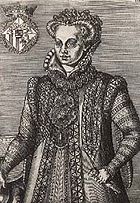
Abraham de Bruyn
Encyclopedia
Abraham de Bruyn, a Flemish engraver
, was born at Antwerp in 1538. He established himself at Cologne about the year 1577, and died there very old. He is ranked among the Little Masters
, on account of his plates being usually very small. He engraved in the manner of Wierix
, and worked entirely with the graver
, in a neat and formal style, but his drawing is far from correct. It is believed that he worked also as a goldsmith. Among his portraits, and prints of small friezes of hunting, hawking, &c., which are esteemed for their neatness, may be mentioned:

Engraving
Engraving is the practice of incising a design on to a hard, usually flat surface, by cutting grooves into it. The result may be a decorated object in itself, as when silver, gold, steel, or glass are engraved, or may provide an intaglio printing plate, of copper or another metal, for printing...
, was born at Antwerp in 1538. He established himself at Cologne about the year 1577, and died there very old. He is ranked among the Little Masters
Little Masters
The Little Masters , were a group of German printmakers who worked in the first half of the 16th century, primarily in engraving. They specialized in very small finely detailed prints, some no larger than a postage stamp...
, on account of his plates being usually very small. He engraved in the manner of Wierix
Wierix family
The Wierix family were a Flemish dynasty of printmakers in engraving in the 16th and early 17th centuries, active in Antwerp and Brussels....
, and worked entirely with the graver
Burin
Burin from the French burin meaning "cold chisel" has two specialised meanings for types of tools in English, one meaning a steel cutting tool which is the essential tool of engraving, and the other, in archaeology, meaning a special type of lithic flake with a chisel-like edge which was probably...
, in a neat and formal style, but his drawing is far from correct. It is believed that he worked also as a goldsmith. Among his portraits, and prints of small friezes of hunting, hawking, &c., which are esteemed for their neatness, may be mentioned:
Portraits

- Philip Louis, Elector PalatinePhilip Louis, Count Palatine of NeuburgPhilip Louis of Neuburg was the Duke of Palatinate-Neuburg from 1569 until 1614.-Life:Philip Louis was born in Zweibrücken in 1547 as the eldest son of Wolfgang, Count Palatine of Zweibrücken. After his father's death in 1569, his lands were partitioned between Philip Louis and his four brothers -...
. - Anne, his consort.
- Albert Frederick, Duke of PrussiaAlbert Frederick, Duke of PrussiaAlbert Frederick was duke of Prussia from 1568 until his death. He was a son of Albert of Prussia and Anna Marie of Brunswick-Lüneburg. He was the second and last Prussian duke of the Ansbach branch of the Hohenzollern family.-Duke of Prussia:...
. - Eleonora, his DuchessMarie Eleonore of ClevesMarie Eleonore of Cleves was a Duchess consort of Prussia as the wife of Albert Frederick, Duke of Prussia. She was the eldest child of Wilhelm, Duke of Jülich-Cleves-Berg and Maria of Austria.- Family :...
. - William, Duke of JuliersWilliam II, Duke of JülichWilliam II, Duke of Jülich was the second Duke of Jülich and the sixth William in the House of Jülich. He was the second son of William I of Jülich and Joanna of Hainaut....
. - Mary, his Duchess.
- John Sambucus, physician; a woodcut.
- Charles IX, King of FranceCharles IX of FranceCharles IX was King of France, ruling from 1560 until his death. His reign was dominated by the Wars of Religion. He is best known as king at the time of the St. Bartholomew's Day Massacre.-Childhood:...
. - Anna, daughter of the Emperor Charles V.
Various subjects
- Moses and the Burning Bush.
- Four plates of the Evangelists. 1578.
- Christ and the Samaritan Woman.
- A Philosopher.
- The Seven Planets. 1569.
- The Five Senses.
- A set of one hundred plates, entitled 'Imperii ac Sacerdotii Ornatus. Diversarum item Gentium peculiaris Vestitus.' 1577-78. (His best work.) Reissued, with some additional plates, and entitled ' Omnium pene Europae, Asiae, Aphricae atque Americae Gentium Habitus.' 1581.
- Seventy-six plates of Horsemen. 1575.
- A set of small friezes of Hunting and Hawking. 1565.
- A set of twelve plates of Animals. 1583.
- A set of Arabesque Patterns.
- Pyramus and Thisbe; after Frans FlorisFrans FlorisFrans Floris, or more correctly Frans de Vriendt, called Floris was a Flemish painter. He was a member of a large family trained to the study of art in Flanders.-Biography:...
. - The Resurrection of Lazarus; after Crispin van den BroeckCrispin van den BroeckCrispin van den Broeck was a Flemish painter. He was born in Mechelen. He came from a family of artists, was probably trained by his father, and was the brother of Willem van den Broeck and Hendrick van den Broeck. He worked as a painter, draftsman and engraver. He was enlisted as a master in the...
.

